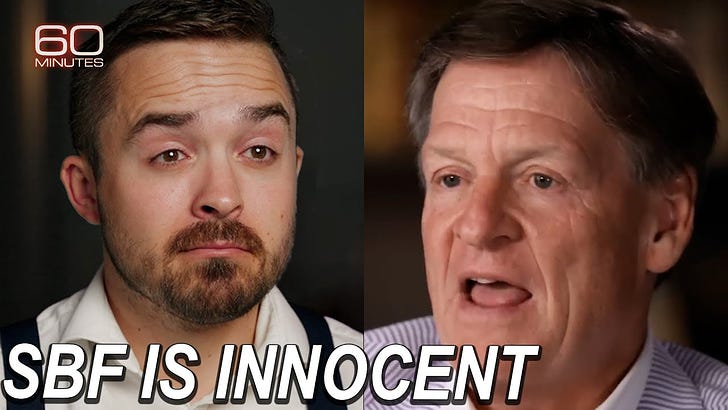FTX: “This Isn’t a Ponzi Scheme”
A wild attempt to paint Sam Bankman Fried (SBF) as a well-meaning effective altruist who accidentally lost $8 billion dollars.
Back in March, on the heels of Silicone Valley Bank’s fiasco, I made the pitch that we should start focusing on…
The human side of incompetency disguised as… Diversity, Equity, and Inclusion (DEI)….
So, today, here we are on Day 4 of the SBF trial, and we have one of the most prolific authors on financial crises and behavioral finance, Michael Lewis, basically appearing, well… flat out incompetent.
He went on 60 Minutes, Sunday, to basically DEFEND, like a giddy cheerleader, SBF’s character and intentions. As if, being an effective altruist by itself excuses all the other fraudulent activities surrounding Alameda and FTX.
But, in that March post, I already covered the ills of virtue signalizing and selling the world-at-large, like a carnival barker, that you’re just out to save the frickin’ world.
“Doing good?"
Let me hand this off to Dave on that point:?
Digging into the nitty-gritty of the SBF trial is something BlockWorks is doing via their SBF Live updates page. Yet, yesterday, one of Byron Gilliam’s readers simply asked a straight-up question:
🤯 Has Michael Lewis lost his mind?
Byron’s answer:
That is the consensus on Crypto Twitter, based on this clip from 60 Minutes.
“They had a great, real business,” Lewis says of FTX. “If no one had cast aspersions on the business, if there hadn’t been a run on customers’ deposits, they’d still be making tons of money.“
That seems like a pretty poor take from someone who wrote an entire book on the subject.
For one, FTX was not a great business.
The exchange’s core selling point, its liquidation engine, did not work as advertised.
Mostly, it was just Alameda taking the other side of toxic order flow and “borrowing” FTX customer funds as their losses mounted.
For two, yes, they might still be in business if there hadn’t been a run on deposits.
But it’s unlikely they’d be making “tons of money.” It’s not entirely clear that they ever made money.
Still, I’m looking forward to reading the book this weekend because I agree with Matt Levine that you go to Lewis for “character and story,” not analysis.
Lewis is neither analyst nor journalist. He's a storyteller.
Liar’s Poker isn’t about investment banking, it’s about the people that work for investment banks.
Moneyball doesn’t explain why the Billy Beane A’s were so good despite a miserly owner (it was the pitching staff, which he doesn’t ever mention), but it’s a fun story, with great characters.
The Big Short annoys CDS experts for being over simplified, But, for everyone else, it’s an entertaining explainer of credit markets.
The information in Flash Boys was five years out-of-date, but Lewis somehow made the minutiae of trading algorithms seem interesting — no easy task.
Michael Oher of The Blind Side wasn’t exceptionally good at football, but Lewis made his life story Hollywood-worthy.
I'm sure Going Infinite will be similar.
I don’t expect to learn much of anything about crypto or FTX. But I do expect to learn about SBF, and that should be entertaining at the very least and possibly enlightening.
Even if he gets FTX all wrong, Lewis will continue to be one of the few authors whose books I immediately pre-order without even looking at what they’re about — whatever story he’s telling always turns out to be a good one.
Some of Lewis’ comments, on 60 Minutes, infuriated CoffeeZilla so much, he has decided to get in on the debriefings.
The inaugural ‘going to watch this trial’ video, from yesterday, is worth your watch:




